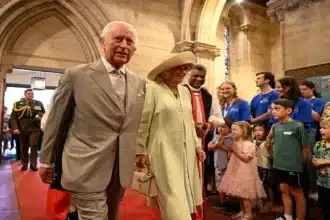In a significant diplomatic move, the European Union (EU), with the exception of Hungary, has issued a stern warning to Israel regarding its planned military offensive in the city of Rafah, located at the southern edge of Gaza. This caution comes amidst the backdrop of a deeply troubling humanitarian crisis affecting approximately 1.5 million refugees in the area. The collective stance of the EU member states, articulated during a meeting of foreign ministers in Brussels, underscores the grave concerns over the potential escalation of an already dire situation.
Ireland’s Foreign Minister, Micheal Martin, voiced a strong objection to the proposed military action in Rafah, describing such an attack as “absolutely catastrophic” and “unconscionable.” This sentiment reflects a widespread apprehension that an escalation of military activities in Rafah could exacerbate the suffering of the civilian population, further complicating the delivery of essential humanitarian aid and basic services.
Following the conclusion of the discussions, a joint statement was issued on behalf of the Foreign Ministers of 26 EU Member States, calling for “an immediate humanitarian pause that would lead to a lasting ceasefire, the unconditional release of all hostages, and the provision of humanitarian assistance.” Hungary, known for its close ties with the Israeli government, was notably the only member state that refrained from endorsing the statement. The collective appeal of the EU ministers to the Israeli government was clear: to avoid military action in Rafah that could worsen the already catastrophic humanitarian situation.
Also Read: Surgical Standstill: South Korean Docs Walkout!
The context for the EU’s concern stems from Israel’s preparation for a ground invasion of Gaza’s southernmost city, Rafah, which it describes as a stronghold of Hamas control following nearly five months of conflict. Israel contends that Hamas fighters are blending in with the civilian population, a claim that Hamas denies. Despite assurances from Israel that “extraordinary measures” are being taken to prevent civilian casualties, the complexity of the situation and the density of the civilian population in Rafah render such assurances challenging to fulfill.
EU foreign policy chief Josep Borrell emphasized the difficulty of avoiding civilian casualties in the densely populated streets of Rafah, advocating for continued pressure on Israel to recognize the severity of the potential humanitarian impact. Borrell’s statement highlights a crucial aspect of the conflict: the need for a balanced approach that prioritizes the safety and well-being of civilians, while addressing the security concerns posed by militant groups.
Also Read: From Hotel Guest to Building Owner: NYC Man’s 5-Year ‘Free Stay’ Saga Ends with a Twist
The EU’s collective call for a humanitarian pause and a lasting ceasefire reflects a broader international concern for the humanitarian implications of continued conflict in Gaza. As tensions escalate, the international community remains watchful, hoping for a resolution that safeguards human lives and leads to a sustainable peace in the region.




